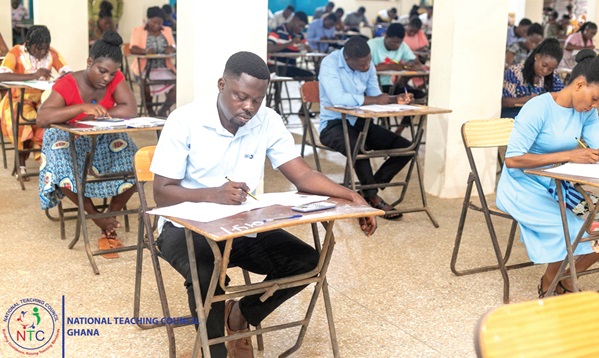
Let’s not politicise teacher licensing
It is said that all professionals can boast, but a teacher taught them all.
Advertisement
A question that comes to mind then is, will all professionals today be happy to hear that their children dream of becoming teachers in the future?
Did you observe the general public reactions to the recent call to the Bar of Lawyers by the General Legal Council?
It was a showcase of honour and prestige.
This can be attributed to the trust in the rigorous process one goes through to be called to the bar as a lawyer.
Can you imagine how it would have been if the General Legal Council eliminated such rigorous and vigorous processes in the training of lawyers; making it easy for anyone to become a lawyer?
Imagine the consequences of the potential flood of unqualified doctors and nurses that might have permeated our hospitals, had it not been for the supposed safeguards put in place by the Ghana Medical Association and the Nursing and Midwifery Council to regulate the profession.
A Daily Graphic Report of September 21, 2016, by Severious Kale Dery titled “New Teacher Licensing starts from 2016/2017 Academic Year” clearly shows the concept of licensing teachers dates to discussions in the education sector from 2015/2016.
In the report, the then acting Chief Inspector of the National Inspectorate Board, Dr Augustine Tawiah, who is currently a Member of Parliament for the Bia West Constituency on the ticket of the National Democratic Congress, is quoted in the report saying “Beginning from the 2016/17 academic year, all newly recruited teachers will have to be licensed before they will be allowed to teach”.
He added: “Those who are already in the teaching service who are professional teachers will be streamlined, while those who are not professional teachers will be given temporary licences for three years”.
Reforms in the teacher education sector
As a country, we should pat ourselves on the back for the various reforms we are embarking on both at the pre-service and in-service levels of our teacher education system.
Most particularly, the goal is to keep pace with the rapidly changing world and ever-improving global standards for education.
At the pre-service teaching level, the Ministry of Education, through its agencies, has undertaken some steps:
Raised the minimum qualification to teach to a Bachelor’s degree.
It is believed that with a Bachelor’s degree, teachers will be well equipped with the knowledge and skill to provide quality teaching, and assessment and ensure effective classroom management practices.
Again, this entry-level is assumed to advertently bring an increase in the entry salary of teachers; a major factor to motivate and perhaps sustain beginning teachers.
NTECF
National Teacher Education Curriculum Framework.
The introduction of the National Teacher Education Curriculum Framework (NTECF) has improved the content area of teacher education in the country while offloading the heavy burden of a few mentor universities, now other universities can step in, support, and even run their own teacher training programmes.
The NTECF has clearly set the national parameters on how teachers should be trained in the country.
National Teachers Standards (NTS).
The National Teachers’ Standards represent the first- ever collectively agreed standards to guide teacher preparation and practice in the country.
The standards have been developed as a professional tool to guide teacher educators, teachers, student teachers and other stakeholders in education to identify in clear and precise terms what teachers are expected to know and be able to do, qualities they are expected to possess and some behaviour they are supposed to exhibit.
Ghana Teacher Licensure Examination (GTLE).
The Education Regulatory Bodies Act 2020, Act 1023 mandates the National Teaching Council to regulate the teaching profession, the council is enjoined by law to run an examination that leads to the issuance of a professional license to newly qualified teachers which enables them to operate as teachers in the country.
It is worth noting that discussions around teacher licensing and professionalism commenced around 2015/2016 and successive governments have since made significant strides in improving the status quo in our quest as a nation to raise the standards of the teaching profession and its brand.
As a result of the significant gains we have made in teacher professionalism, Ghanaian teachers perform well globally.
Ghanaian teachers are well sought after in Africa, Europe, the Americas and Asia.
Presently, Ghanaian teachers have been exempted from any assessment for Qualified Teachers Status in the United Kingdom which has led to the mass exodus of teachers from Ghana to the United Kingdom and other parts of the world.
In the lead-up to the 2024 general election, political parties are entreated not to politicise issues surrounding teacher licensing and professionalism.
The various Education Manifesto Committees of political parties should consult experts in propounding areas that will consolidate the gains made with the reforms in our teacher education system.
The writer is the Editor of the Teacher Education Journal.
Email: [email protected]




